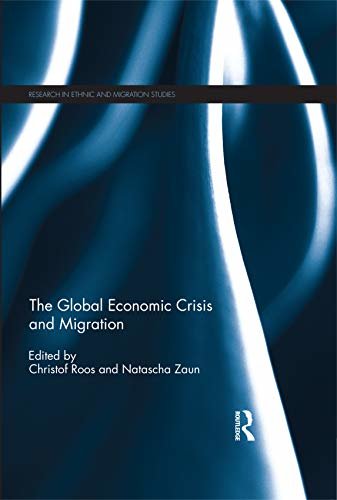
The Global Economic Crisis and Migration (Research in Ethnic and Migration Studies) (English Edition)
- 作者
- Christof Roos、Natascha Zaun
- 语言
- 英语
- 出版社
- Routledge
- 出版日期
- 2018年10月18日
- 纸书页数
- 164页
- 电子书格式
- epub,pdf,mobi,azw3,txt,fb2,djvu
- 文件大小
- 5477 KB
- 下载次数
- 1673
- 更新日期
- 2023-07-20
- 运行环境
- PC/Windows/Linux/Mac/IOS/iPhone/iPad/iBooks/Kindle/Android/安卓/平板
内容简介
Offering an in-depth analysis of the impact of the economic crisis (2008–2012) on immigration movements and policies in the U.S. and Europe, the analysis in this book is guided by two key questions: What is the scope of change?; and did the crisis motivate this change or did other factors do so?
The contributions to the book find that the crisis had immediate effects on migration patterns – migrants left crisis-stricken countries, naturalised in non-crisis countries where they had previously settled, or stopped migrating to formerly attractive countries which had been negatively affected by the crisis. Whereas prior to the crisis the majority of migrants were highly-skilled, during the crisis there was a shift to vulnerable groups such as low-skilled workers and women.
The book also finds that migration policies have indeed changed in times of crisis. However, these changes are neither exclusively restrictions nor liberalisations, but encompass changes in both directions. Despite the coincidence of many policy changes with the crisis, these changes are not primarily induced by the crisis. Instead, politicians rhetorically used the crisis to promote both liberal and restrictive policy changes which were already in the making before the crisis. This book was originally published as a special issue of the Journal of Ethnic and Migration Studies.
The Global Economic Crisis and Migration (Research in Ethnic and Migration Studies) (English Edition) EPUB, PDF, MOBI, AZW3, TXT, FB2, DjVu, Kindle电子书免费下载。
- 读懂“一带一路” 厉以宁、智石经济研究院
- 认知商:如何认清现实与错觉?(了解你自己看待和理解世界的方式,提升认知商,成为理性和清醒的人) 布莱恩·博克瑟·瓦赫尔、杜飞、曹迪
- 原则 爆裂 混乱 盗火(4册)(2018年中信好书优选推荐!) 瑞·达利欧、伊藤穰一、蒂姆·哈福德、史蒂芬·科特勒
- Wittgenstein: Making Sense of Other Minds (Routledge Revivals) (English Edition) Mark Addis
- 神在人间的时光 陈喜辉
- Music Learning as Youth Development (English Edition) Brian Kaufman、Lawrence Scripp
- 全健康科技进展 周晓农、郭晓奎、谢青
- Bassett's Environmental Health Procedures (English Edition) W.H. Bassett、Tim Deveaux
- Measure and Design in American Painting, 1760-1860 (Routledge Library Editions: Art and Culture in the Nineteenth Century Book 1) (English Edition) Lisa Fellows Andrus
- 低风险投资十八种武器 (雪球「岛」系列) 铁公鸡金融
- 痛点:挖掘小数据满足用户需求 马丁·林斯特龙、陈亚萍
- Progressive Justice in an Age of Repression: Strategies for Challenging the Rise of the Right (English Edition) Walter S. DeKeseredy、Elliott Currie
- 力量训练减脂全书(修订版)(高效减脂同时保持肌肉量的3C训练法) 尼克·特米勒罗
- 资本与共谋:全球经济发展的政治逻辑(发掘主权国家政治和社会结构落后的原因及其解决办法) 希尔顿·鲁特、刘保成
- 神经外科健康教育手册 王丽芹、纪欢欢、侯涛
- 忧患 (刘君祖) 刘君祖
- The German Working Class 1888 - 1933: The Politics of Everyday Life (Routledge Library Editions: German History Book 11) (English Edition) Richard J. Evans
- Pet Loss, Grief, and Therapeutic Interventions: Practitioners Navigating the Human-Animal Bond (Explorations in Mental Health) (English Edition) Lori Kogan、Phyllis Erdman
- Corporate Environmental Reporting: The Western Approach to Nature (Routledge Studies in Accounting Book 33) (English Edition) Leanne J Morrison
- Anticipation and Medicine: A Critical Analysis of the Science, Praxis and Perversion of Evidence Based Healthcare (Concepts for Critical Psychology) (English Edition) Owen Dempsey
- Penhallow (English Edition) Georgette Heyer
- 中信国学大典:文学经典(上册)(套装共6册) 陈致、陈珀如、康震、向铁生
- 北大国情报告 林毅夫、姚洋、黄益平
- Residential Work with Offenders: Reflexive Accounts of Practice (English Edition) Emma Wincup
- 艺术激发潜能:版画作为艺术治疗的媒介研究 张亚敏
- 新思文库·罗马帝国的陨落:一部新的历史(罗马史诗三部曲) 彼得·希瑟、向俊译
- 理财实验室——超强数据验证过的事(简七理财017) 简七理财
- 科学防控糖尿病 侯雨、童利伟、邓春颖
- 南开史学(2021年第1期/总第31期) 江沛
- 生态文明视域下运动休闲小镇的发展 王念龙